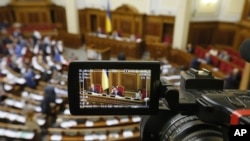A leading advocate for media freedom warned Tuesday that the climate for journalists in Europe is deteriorating as governments react to political crises with restrictions that include physical harassment, bans on freedom of movement and limits on freedom of expression.
Dunja Mijatovic, media freedom representative for the Organization for Security and Cooperation in Europe, cited attempts by Ukraine and the Baltic states to keep out journalists with strong pro-Russian views, and anti-terror laws in Western Europe that she said limit freedom of expression. She also denounced Hungarian police for threatening reporters covering the refugee crisis.
"In the name of security, governments are adopting laws that can definitely have a negative effect on media freedom and freedom of expression, even in established democracies,'' Mijatovic told The Associated Press on the sidelines of an OSCE conference in Warsaw.
Ukraine has come under criticism in recent days for blacklisting more than 40 journalists and bloggers as it expanded sanctions against Russia over its involvement in the conflict in eastern Ukraine. Three of those banned were employees of the BBC's Moscow office. Ukrainian President Petro Poroshenko removed their names from the list a day later after the list sparked an outcry.
Mijatovic said the Baltic states, which are EU members, have also banned or deported Russian journalists fearing they could be tools of state propaganda.
"I think it's the wrong way. That's not the way democracies should be dealing with these things,'' Mijatovic said. "Ensuring security in the country is not something that will happen by banning journalists.''
Cases in Hungary
Last week, Mijatovic demanded that Hungary stop threatening journalists after Hungarian police beat and harassed reporters covering Europe's migration crisis. She cited four cases, including the case of an Associated Press cameraman who was briefly detained and told to delete footage that included images of a police dog knocking down a refugee.
The Hungarian government has denied that it ever beat or harassed reporters, but Mijatovic said she stood by her accusations, which have all also been confirmed by the affected media outlets.
"To say that this did not happen is quite cynical,'' she said.
"Beating journalists, detaining them, asking them to delete footage, smashing their equipment is definitely not something I would want to see in any state, but talking about the EU and democracies, it's totally unacceptable,'' she said.
As other examples of the erosion of media freedoms, Mijatovic noted that France passed anti-terror legislation last November that allows authorities to block websites, without adequate judicial oversight, and that Spain has also adopted laws that "represent a clear setback in the protection of free speech.''




